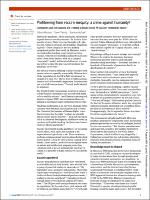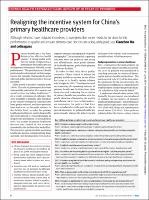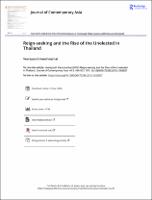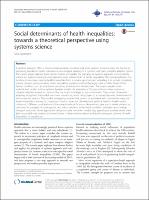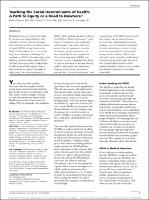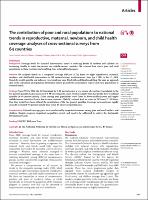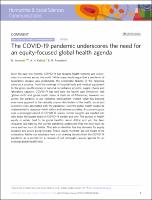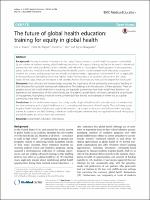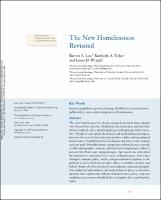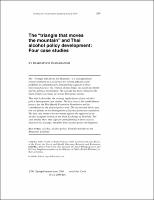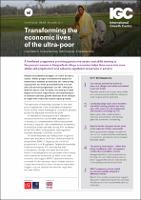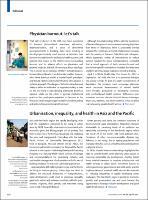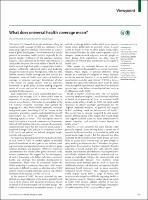Browsing by Resource Type "journalArticle"
Now showing items 41-54 of 54
-
PRISM
(the Institute for National Strategic Studies at the National Defense University, 2021)
The global COVID-19 pandemic of 2020-2021 has catalyzed a re-examination of what national security consists of, and what responsibilities the world’s armed forces must or should assume to meet such non-military challenges. Yet the competition between the United States and its adversaries has intensified, requiring that the national security enterprise retain traditional capabilities while keeping up with the fierce pace of technological innovation. PRISM V.9,N.2 authors address the emerging challenges armed forces must meet, offer perspectives ... -
Profiteering from vaccine inequity: a crime against humanity?
(BMJ, 2021-08-16) -
Realigning the incentive system for China’s primary healthcare providers
(BMJ, 2019-06-21) -
Reign-seeking and the Rise of the Unelected in Thailand
(Journal of Contemporary Asia, 2016)
This article develops the concept of “reign-seeking” to capture the unprecedented collective action of the Thai professional and official elite prior to the 2014 military coup and the establishment of a military regime. It argues that this phenomenon reflects broad and deep political dynamics, for which the dominant scholarship on authoritarianism and Thai politics cannot adequately explain. The changing incentives of these supposedly non-partisan actors are interwoven with neo-liberal governance reform driven by a desire for depoliticisation and ... -
Social determinants of health inequalities: towards a theoretical perspective using systems science
(2015)
A systems approach offers a novel conceptualization to natural and social systems. In recent years, this has led to perceiving population health outcomes as an emergent property of a dynamic and open, complex adaptive system. The current paper explores these themes further and applies the principles of systems approach and complexity science (i.e. systems science) to conceptualize social determinants of health inequalities. The conceptualization can be done in two steps: viewing health inequalities from a systems approach and extending it to ... -
Teaching the Social Determinants of Health: A Path to Equity or a Road to Nowhere?
Medical schools are increasingly called to include social responsibility in their mandates. As such, they are focusing their attention on the social determinants of health (SDOH) as key drivers in the health of the patients and communities they serve. However, underlying this emphasis on SDOH is the assumption that teaching medical students about SDOH will lead future physicians to take action to help achieve health equity. There is little evidence to support this belief. In many ways, the current approach to SDOH within medical ... -
The contribution of poor and rural populations to national trends in reproductive, maternal, newborn, and child health coverage: analyses of cross-sectional surveys from 64 countries
(The Lancet Global Health, 2017)
Background Coverage levels for essential interventions aimed at reducing deaths of mothers and children are increasing steadily in most low-income and middle-income countries. We assessed how much poor and rural populations in these countries are benefiting from national-level progress. -
The COVID-19 pandemic underscores the need for an equity-focused global health agenda
(2021-12)
Over the past few months, COVID-19 has ravaged health systems and economies in countries across the world. While many would argue that a pandemic of respiratory disease was predictable, the systematic failures of the response came as a surprise. From the shortage of hospital beds and medical equipment to the gross insufficiencies in national surveillance systems, supply chains and laboratory capacity, COVID-19 has laid bare the health care limitations that ‘global north’ and ‘global south’ share. A stark set of differences, however, run across ... -
The future of global health education: training for equity in global health
(BMC Medical Education, 2016)
Background: Among academic institutions in the United States, interest in global health has grown substantially: by the number of students seeking global health opportunities at all stages of training, and by the increase in institutional partnerships and newly established centers, institutes, and initiatives to house global health programs at undergraduate, public health and medical schools. Witnessing this remarkable growth should compel health educators to question whether the training and guidance that we provide to students today is appropriate, ... -
The New Homelessness Revisited
(Annual Review of Sociology, 2010)
The new homelessness has drawn sustained attention from scholars over the past three decades. Definitional inconsistencies and data limitations rendered early work during this period largely speculative in nature. Thanks to conceptual, theoretical, and methodological progress, however, the research literature now provides a fuller understanding of homelessness. Contributions by sociologists and other social scientists since the mid-1990s differentiate among types of homelessness, provide credible demographic estimates, and show how being homeless ... -
The “Triangle That Moves the Mountain” and Thai Alcohol Policy Development: Four Case Studies
(Contemporary Drug Problems, 2009)
The “Triangle that Moves the Mountain” is a conceptualized strategy initiated as a social tool for solving difficult social problems, by simultaneously strengthening capacity in three interrelated sectors: (1) creation of knowledge; (2) social movement; and (3) political involvement. The concept has been claimed as the basis of many successes in various Thai policy arenas. This article describes the strategy implications of four alcohol policy development case studies. The first case is the establishment process for the Thai Health Promotion ... -
Transforming the economic lives of the ultra-poor
(International Growth Centre, 2015)
Despite considerable progress in recent decades, nearly 1 billion people worldwide live below the international extreme poverty line of $1.90 per day. A group that has been particularly hard to reach with anti-poverty programmes are the ‘ultra-poor’. With low assets and few skills, the ultra-poor work largely in insecure wage labour, do not participate in modern economic growth and have been difficult to target with credit and human capital policies. -
What does universal health coverage mean?
(The Lancet, 2014)


